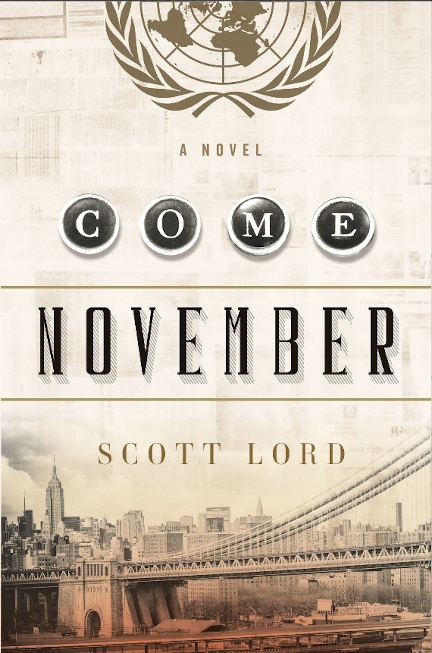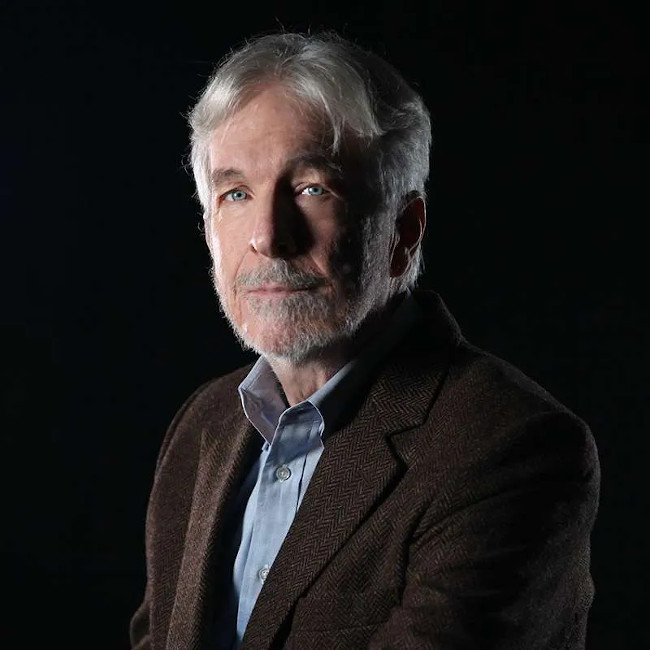Scott Lord Pens New International Thriller ‘Come November’

Michael Hanson, phone in hand, stood looking out the window of his second-story office on Montana and Twelfth Street in Santa Monica. It was an inexpensive suite on an expensive street—just one small room and a secretarial station—but it was a prestigious address and that was important to him.
Diane, his secretary, went home early because of a childcare emergency. Ordinarily, Michael would have been annoyed, but somehow aiding Diane in her childcare efforts worked to assuage his considerable guilt regarding his daughter, Alice, who now lived on the other side of the country. His lawyer had told him that since she was sixteen, most judges would let her choose which parent she wanted to live with and, to no one’s surprise but Michael’s, she chose to live in New York City with her mother, Kerry.
With Diane gone, he had to answer his own phone, which was why he was now stuck talking to one of his disgruntled investors, Emily Poverstein. He held the receiver an inch or two away from his ear.
“Michael, you said I’d have my fifty-thousand-dollar investment back by January, but it’s almost June,” she said.
Mrs. Poverstein was one of ten investors he had sold on the Casa Palacios project, at fifty thousand each, which he had to personally guarantee. That had been the only way to convince them to trust him with their money. Real estate was booming then and it hadn’t seemed like much of a gamble. Then all the trouble in the Middle East started. Weapons of mass destruction were everywhere, they said, and no one wanted to buy the expensive condominiums he and his partners were building.
“Well, it’s actually April, but I know, it’s absolutely wrong that they haven’t paid you your money yet,” he said in the low, comforting tones of a professional mourner.
“You told me I’d double my money!”
“Now, Mrs. Poverstein, I might have said that was possible, but if you look back at the materials you signed, you’ll see that we were giving you our best projections, not making any promises.”
“You know, I’ve been very patient, but I have half a mind to report you to—”
“Mrs. Poverstein,” Michael interjected, his patience exhausted, “please don’t say something we’ll both regret.”
“Sorry.”
Michael drew a deep audible breath, an indulgent parent reluctantly preparing to reason with an unruly child. “I think you are being unfair. But,” he said, holding up his hand as if she could see him taking a pledge, “I won’t have an unhappy client. If you want me to take you out of your position, say the word. I’ll write you my own check for your fifty thousand.” Not that he actually had that much. “But if you wait, the projections as they stand now lead me to believe you won’t be doubling your money—you’ll be tripling it.”
Mrs. Poverstein gulped. “Tripling?”
“Just be patient a little while longer. Remember, Emily, I’m in this with you.” That, at least, was true. Michael had invested every penny he had in the project.
“If you really think so.”
“I do.”
“Tripling, you think?”
Michael did something he hadn’t done since he was twelve. He crossed his fingers. “Tripling.”
“All right then, I guess I’ll stick with it.”
“You won’t regret it. Goodbye, Emily.”

Michael was trembling. This was the third such call this week. His investors were nervous. Construction was six months behind schedule for no discernible reason and pre-sales were slow.
He walked from the window to the antique oak bar that stood in the corner near the window. It had belonged to his father. “My inheritance,” he’d tell people. He poured an inch of Irish whiskey into a low tumbler and drank it off in one swallow. It had been a two-drink minimum kind of day, so he poured another, this time mixing in soda and ice. He took the fresh drink back to his desk, sank into the high-backed leather chair, and stared out the window into the gathering dusk. He looked around his modest office. He was turning forty this summer. If success was going to happen, shouldn’t it have happened by now?
It was nearly five thirty. Damn! He’d meant to check on his mother. She picked up on the first ring.
“Hello?”
“Mom, it’s me.”
“Michael.” The way she said his name always made him feel she was enormously glad to hear his voice. “How are you, honey?”
He smiled. “No, how are you?”
“I asked first.”
“Come on,” he said, “tell me.”
“I’m fine, really. I spent most of the day reading. Went in the garden for a bit and took a walk around the block. I don’t have classes because of spring break.”
“You timed your hospital visit for spring break?”
“Of course. I didn’t want to put anyone out.” Her considerate nature had always been a joke between them. “It was wonderful just to be out in the sun. There was a little breeze coming from the ocean. Makes me feel like taking a trip.”
“I know. I wish I could have gotten out of the office.”
“How is work?”
Michael thought about confiding in her but rejected the idea. He trusted her to be sympathetic no matter what the problem, but this was different. The money he’d invested belonged to people like her, older folks who had trusted him with their retirement savings.
“Oh, you know, same old, same old. Real estate development isn’t for sissies.”
“You’re not a sissy, Michael.” “I was just joking.”
“I know,” she said, forcing a chuckle. “Anything really wrong?”
“No, not at all.”
“You’d tell me?”

“You’d be the first one I’d tell. You know I’m a momma’s boy.” They both laughed. It was a story from his childhood. It started when his parents told him they were separating. Their words were hardly out of their mouths when eight-year-old Michael blurted out, “I’m gonna live with Momma.” It was one of his father’s rare sober days. He had nodded grimly and, as he was leaving, Michael heard him say, “What do you expect? He always was a momma’s boy. Kid’s a sissy.”
At first, Michael had seen his father every other Saturday. But soon he began to cancel their visits. Weeks, then months, would pass between them until eventually they ceased altogether. His mother gently explained to Michael that his father, while a good man in many ways, had a viciously intractable addiction to alcohol. He died when Michael was in college.
“You sure you’re okay, Mom?”
“I’m sure. And I see the doctor again tomorrow. He’s going to run a couple of tests in the office. I’ll drive myself.”
Michael didn’t respond. He knew it irritated her to feel dependent. “Something else on your mind?”
“Well, yes. If you have a minute.”
“I’m all ears.”
“I got a funny email today.”
Michael couldn’t help laughing.
“Stop it,” she said, a smile in her voice.
“It still cracks me up. Five years ago, you didn’t own a computer—now you email like an old pro and teach classes online.”
“You’re exaggerating. Anyway, I got an email.”
Michael, still laughing a little, said, “From an old lover, right?”
“Yes, as a matter of fact.”
Michael stopped laughing.
“I . . . It’s hard to talk about.” She seemed to change her mind. “Actually, it’s a long story. I’ll tell you tomorrow. If you’re really interested, that is.”
“I am. You should get some rest, anyway, and I have a few calls to make.” A few more investors to soothe. Maybe he should just tell her he needed her help.
“By the way,” she said, “that lawyer you referred me to says the insurance company will pay off soon.”
“Yeah?” he said quietly, struggling to sound casual at the mention of money. “He thinks they’ll cave?”
“That’s what he says.”

Although it had been a year since his death, Jim’s life insurance company still hadn’t paid Jeanne the proceeds of his policy—one million dollars. The adjuster assigned to the case had raised questions about the pain medications Jim had been taking—implying he’d taken his own life, which would allow them to reject the claim. Jim’s medical team had managed to douse that suspicion. Undeterred, the company then asserted there were technical deficiencies in Jim’s original application and they were investigating the “possible concealment of a serious medical condition.” It was then that Jeanne hired Michael’s lawyer.
A million dollars. To a woman who owned her pricey home free and clear and had six figures in stocks and bonds. The thought of that much money made Michael almost physically ill. She could easily afford to help him out of his present difficulty.
“Mom?”
“Mm-hmm?”
No, not yet. “Nothing.” It was too soon to ask for her help and to confess his failure. He said instead, “I’m just glad you’re okay. Take it easy.”
“Okay, honey, thanks for calling.”
“Of course. Bye.”
“Bye.”
Michael hung up. He had planned to call his other investors but decided tomorrow would do. He grabbed his jacket, locked the door, and walked the mile to his two-bedroom apartment on Ocean at the end of Montana. Normally, he would have driven his Porsche 911 to the office, but it was ten years old and not as reliable as it once had been. Like a lot of things.
This excerpt is adapted from the forthcoming book, Come November (July 2023), by Scott Lord. It’s published here with permission.
Highbrow Magazine
Image Sources:
--Lukas Rychvalsky (Pixabay, Creative Commons)
--Lucky Silver1 (Pixabay, Creative Commons)
--Greenleaf Book Group Press




























































































































































































































































































































